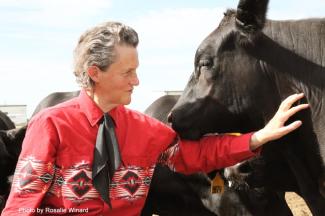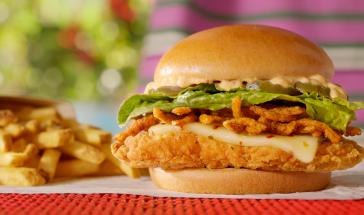What’s humane when it comes to Animal Welfare?

This post was published in 2016; to view the most up-to-date information, visit
https://www.wendys.com/csr-what-we-value
Once again, welcome back! Or if you’re here for the first time, we’re glad you’ve joined us. Be sure to check out our first two blogs if you want to catch up.
Today, I want to cover some ground as it relates to our views on animal welfare and the humane treatment of the animals we rely on to provide our food.
So what’s “humane” when it comes to these animals? It’s a question that spurred us to begin auditing our suppliers for their animal welfare practices nearly 20 years ago, and it’s one we focus on a lot. In its simplest form, we ask what’s best for the animal and their basic nature.
Looking To The Experts
We rely on experts in veterinary medicine, we review literature, we talk to suppliers, and we spend time with the people who know animals best, like Dr. Temple Grandin.
Dr. Grandin is one of the top experts in the field of humane livestock handling. She and other welfare experts serve on our external council, supporting and challenging us to continually evolve our programs. Over the years, these experts and our own in-house team have informed our approach and encouraged us to stay in lock-step with industry best practices about animal agriculture.
We’re not always the flashiest headline grabbers, and we pride ourselves on being thoughtful and informed by science and data to make decisions. But we believe this approach has served us well, and more importantly, it’s served animals well.
In 2001 we formed our Animal Welfare Advisory Council to review and strengthen our standards. Throughout the years, many aspects of those standards were shared and adopted industry wide and since then, we’ve conducted more than 1,300 audits.
What Is An Audit?
An audit is the practice used in the agriculture and farming industry to monitor, verify and evaluate proper animal handling among suppliers. This effort is based on extensive research conducted by experts in animal behavior science.
Now, you may be asking yourself, what makes Wendy’s so special as it relates to their audits?
-
First, we start with our standards, and before a supplier can even enter our supply chain, we assess their facilities and practices and ensure they meet or exceed our requirements.
-
Second, we use our own team of experts to audit every single supplier. We start by auditing twice a year. If a supplier passes with flying colors three years in a row – that means getting a score of at least 97.5 on a 100 point scale – they are then audited by us once annually. And the passing score on our audits is 90 out of 100. Anything less than that – or failure on even one critical element – is a failed audit. A failure results in a surprise re-audit that’s conducted between 30-60 days, and if you fail twice, you can’t be a Wendy’s supplier.
-
Third, we make sure to audit the auditors, and every supplier receives an additional annual audit from a third party expert who follows guidelines from the Professional Animal Auditor Certification Organization (PAACO). You can check out the guidelines and learn more about this organization by clicking here.
We’re strict but fair, and we stick to our rules.
Check out our auditing scorecard. You’ll notice that the average scores have improved steadily over time in all species. Spurring continuous improvement is a primary motivation for our audits. Our suppliers work with us to continually improve, and to adjust their practices as our standards evolve and rise.
You’ll also notice that there have been failed audits. Not all suppliers pass our audits, and in some cases suppliers were not able to adhere to our standards and they are no longer suppliers to Wendy’s. We rely on our core values to guide us – especially Do the Right Thing – and while those decisions can be difficult, they’re necessary.
Fortunately, failed audits are not the norm because we work with some of the very best suppliers in the industry. Our shared values and our transparent and objective approach to auditing against clear standards makes the entire system stronger.
We are always looking to stay current with evolving welfare standards and we adopt a continuous improvement mindset.
Click here to download a snapshot of the progress and changes we’ve made to our various animal housing and handling standards throughout the years.
Now let’s dig into some of our more recent commitments we’ve made in this area:
-
While the current thinking and science behind gestation stalls is split within the scientific and agriculture communities, we gave this issue thoughtful consideration and believe that it is difficult to justify sows spending that much time in a stall. In the spirit of doing the right thing, in 2014 we set a goal to eliminate the use of gestation stalls by 2022 and are making good progress on this commitment as we currently source about 30% of our pork from suppliers who meet this standard.
-
In 2009, as our breakfast program evolved, we began purchasing a small amount of eggs from suppliers who raise their birds in open houses. These layers are often called cage-free. Although we later decided to only pursue breakfast in limited locations – about 400 out of more than 6,000 restaurants in the U.S. and Canada – we made the decision in early 2016 to transition to 100 percent cage-free eggs in our U.S. and Canadian restaurants by 2020. While industry practices seem to be moving in the direction of buying cage-free eggs, we’re working with our suppliers now to ensure that they can meet our needs for a 100% cage-free egg supply by our 2020 goal and do this in the best way possible for them, the birds and us.
Bottom line, whether we purchase a lot of a product (hello, Baconator) or a little, we want to make sure we’re doing the right thing as it relates to the animal. This is why we share these milestones and our auditing scorecard with you.
More information to come as it relates to other aspects of our animal welfare program.
Feel free to drop us a line at squaredeal@wendys.com or fill out the fancy form under ‘contact us’ if you have questions or further comment.
Talk to you soon!
Liliana




